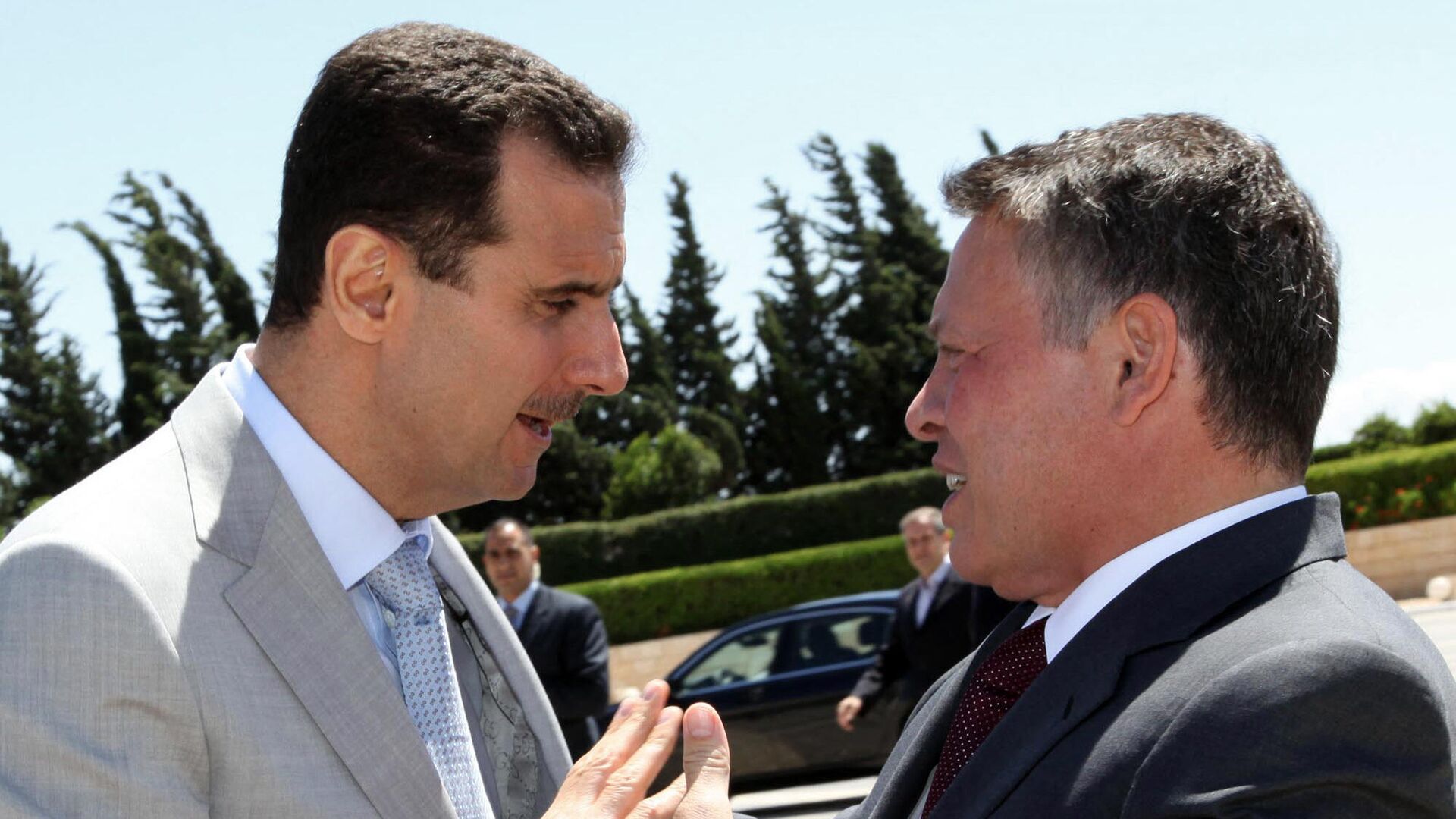Syrian President and Jordan's King Speak for the First Time in a Decade
10:08 GMT 04.10.2021 (Updated: 16:46 GMT 08.01.2023)

© AFP 2023 / YUSSEF ALLAN
Subscribe
Ties between the two nations have soured since the start of the 2011 war in Syria, with Amman reducing diplomatic relations with its neighbour and allegedly hosting western-backed opposition groups that Damascus considers terrorists.
Syrian President Bashar al-Assad and Jordanian King Abdullah II have spoken to each other for the first time in a decade. According to the Syrian state-controlled news agency SANA, Mr Assad called his counterpart on 3 October to discuss bilateral relations and ways to boost cooperation "in the interests of the two countries and people".
The palace released a statement saying the pair discussed "relations between the two brotherly nations and ways of enhancing cooperation". King Abdullah II told his counterpart that Amman supports Syria's territorial integrity and efforts to preserve its "stability and sovereignty", said the statement released by the palace.
The development comes as there has been a thaw in relations between the two countries. In September, the Jordanian media reported that the nations had revived a 10-year-old deal, which sees Egyptian natural gas being transported via Jordan, Syria, and Lebanon. Last month, the Syrian defence minister arrived in Jordan to discuss a range of issues, while last week, Jordan reopened a border crossing with Syria in a bid to boost cooperation
Sunday's call between the two heads of state is widely seen as an attempt to cope with the economic problems that have been plaguing both nations.
According to the World Bank, the coronavirus pandemic has not drastically slowed down Jordan's economy, with Amman experiencing what the organisation described as a "modest" 1.6 percent contraction. However, it did result in economic woes, "leading to widening of twin deficits, rise in the debt levels, and unprecedented rise in unemployment rates, particularly among the Jordanian youth".
Syria's economic activity has plummeted by more than 60 percent during the ongoing civil war, which pushed millions of people into unemployment and poverty, the World Bank says.
In recent months, Jordan, a staunch ally of the United States, has been encouraging Washington to normalise ties with Syria, which soured following the start of the 2011 war. In particular, it wants the White House to lift parts of the 2019 Caesar Act, which imposes sanctions on foreign companies doing business with Damascus.
The palace released a statement saying the pair discussed "relations between the two brotherly nations and ways of enhancing cooperation". King Abdullah II told his counterpart that Amman supports Syria's territorial integrity and efforts to preserve its "stability and sovereignty", said the statement released by the palace.
The development comes as there has been a thaw in relations between the two countries. In September, the Jordanian media reported that the nations had revived a 10-year-old deal, which sees Egyptian natural gas being transported via Jordan, Syria, and Lebanon. Last month, the Syrian defence minister arrived in Jordan to discuss a range of issues, while last week, Jordan reopened a border crossing with Syria in a bid to boost cooperation
Sunday's call between the two heads of state is widely seen as an attempt to cope with the economic problems that have been plaguing both nations.
According to the World Bank, the coronavirus pandemic has not drastically slowed down Jordan's economy, with Amman experiencing what the organisation described as a "modest" 1.6 percent contraction. However, it did result in economic woes, "leading to widening of twin deficits, rise in the debt levels, and unprecedented rise in unemployment rates, particularly among the Jordanian youth".
Syria's economic activity has plummeted by more than 60 percent during the ongoing civil war, which pushed millions of people into unemployment and poverty, the World Bank says.
In recent months, Jordan, a staunch ally of the United States, has been encouraging Washington to normalise ties with Syria, which soured following the start of the 2011 war. In particular, it wants the White House to lift parts of the 2019 Caesar Act, which imposes sanctions on foreign companies doing business with Damascus.
In an interview with CNN in July, Jordanian King Abdullah II said Syrian President Bashar al-Assad is here to stay, noting that the West-backed position that Damascus should be ostracised is untenable. Last week, a spokesperson for the US State Department said that Washington had no plans to "normalise or upgrade" relations with Syria and was not encouraging other nations to do so.
